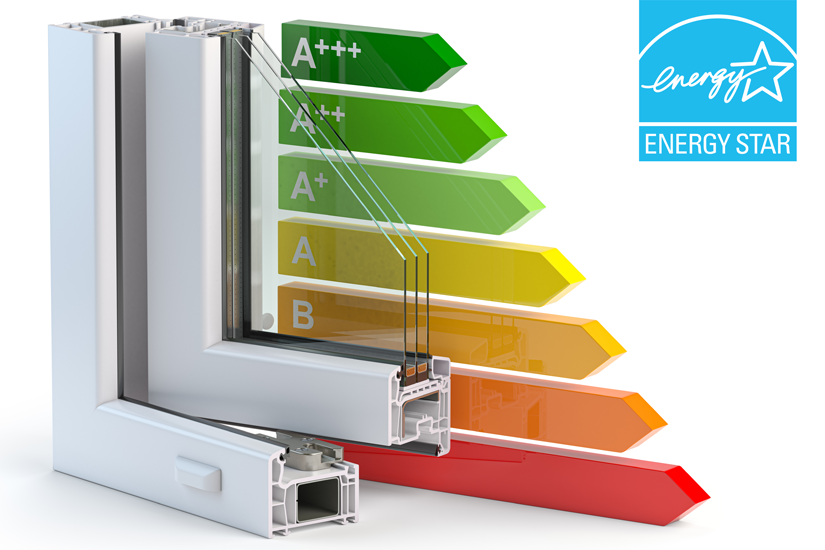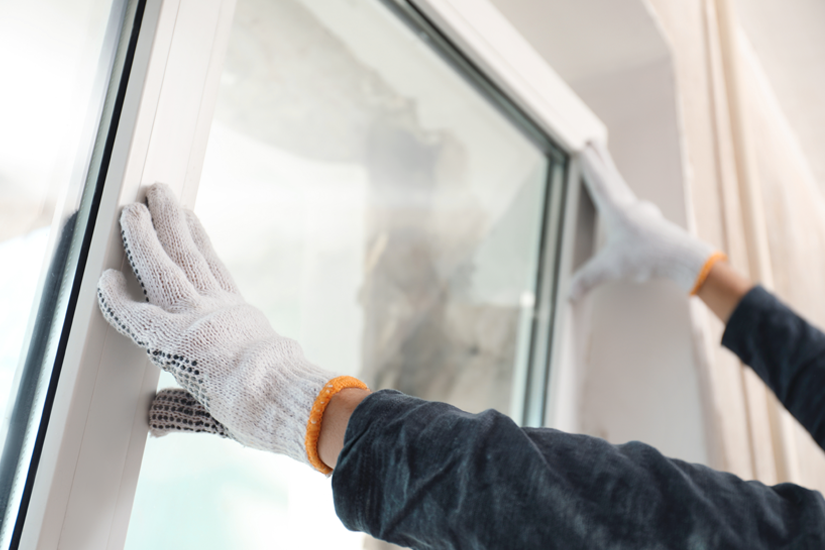There is a saying that says, ‘Home is where the heart is.’ But in Windsor, Ontario, home is also where we need to manage our energy bills better. With climate change and heat levels hitting new records every other week, every homeowner needs to invest in energy efficient windows.
Thanks to modern technology, energy-efficient windows are now a viable option for homeowners in Windsor Ontario, seeking to enhance their renovations, manage heat loss, increase natural lighting, and reduce air leakage.
However, buying energy efficient windows isn’t just pulling a product off the shelf; you need to really research consumer guides for window buying. After all, this is going to be a larger purchase for your home and we’re here to guide you through this glass labyrinth.
Exploring Window Styles:
Awning Windows, Bay Windows, and More
When shopping for the best energy efficient windows, you might come across a plethora of window styles, such as awning windows and bay windows.
Awning windows have hinges at the top and open outward, providing excellent ventilation and protection from rain. Bay windows extend outward from the wall, offering additional indoor space and panoramic views. Both types can add a unique architectural charm to your home.
Sliding Windows and Egress Windows
If you prefer a contemporary look, sliding windows could be your pick. These windows are easy to operate, providing you with more natural light. If safety is a concern, consider egress windows for your bedrooms and basements.
These windows meet safety standards, offering a safe exit in case of emergencies.
Consideration 1: Deciphering the Energy Efficiency Ratings
The ABCs of Efficiency
Energy efficient windows come with efficiency ratings akin to report cards for the windows. An efficient window with an excellent rating performs well in terms of reducing energy loss, mitigating air leaks, and providing an airtight seal. This translates to lower energy costs and more comfortable indoor environments. But remember, the U-factor and visible transmittance are crucial energy ratings to consider.
Where to Look? The ENERGY STAR Label
Look for the ENERGY STAR label.
It’s a certification indicating the window meets or surpasses standards set by the ENERGY STAR program, run by the National Fenestration Rating Council (NFRC). NFRC ratings, including the Solar Heat Gain Coefficient, are the industry benchmark for window energy efficiency, with lower numbers indicating superior energy savings.
Consideration 2: The Material Matters
Choosing the Frame Material
The window frame material greatly impacts the energy efficiency of your windows. Whether you’re considering vinyl frames, wood windows, or fiberglass, each material has unique pros and cons.
For instance, vinyl windows are known for their affordability and low maintenance, while wood frames excel in insulating properties but require more upkeep.
Quality Material and Energy Performance
Framing and Glass Options
Building materials greatly impact the window’s energy performance. The most common frame materials include wood, vinyl, fiberglass, and aluminum. Each offers distinct advantages in durability, maintenance, insulation, and aesthetics.
When choosing glass options, you might encounter double-pane windows or even triple-pane windows filled with argon or krypton gas for superior insulation.
Edge Spacers and Window Glass
The edge spacers between the glass panes in windows prevent heat escape and condensation. Spacers made of low-conductive material, like silicone foam, can further enhance energy performance. Window glass with special coatings, such as Low-E coatings, can reduce heat transfer, making your home more energy-efficient.
Glazing Options and Glass Coatings
The type of glazing—single, double, or triple pane—and the presence of Low-E coatings also determine how efficiently a window insulates.
Double-glazed or even triple-glazed windows with argon gas fill offer high performance in terms of energy efficiency and noise reduction. These are especially beneficial if your home’s architecture involves large glass sections or an architect series.
Understanding Low-E Coatings
What is Low-E Glass?
Low-E glass (low emissivity) is coated with a thin layer of metal oxide. This coating reflects heat back to its source, helping to reduce energy consumption. It also minimizes the harmful UV rays that can fade your furniture and flooring.
The Role of Low-E Coatings
Low-E coatings can significantly improve your window’s energy efficiency by reducing heat loss in winter and heat gain in summer. Low-E glass coating is a worthy investment for homeowners aiming for energy savings.
Consideration 3: The Right Glazing Type
Light and Visibility Factors
The Importance of Visible Light. High-quality windows don’t just save energy; they can also enhance the amount of visible light your windows let into your home. An ideal energy-efficient window balances thermal control with adequate natural light, offering a bright, cozy space for your family.
UV Rays and Solar Radiation
While natural light is beneficial, unchecked solar radiation can lead to excess heat and potential damage to interior furnishings. Energy-efficient windows help to mitigate these harmful effects while still letting in plenty of light.
Double Glazing Vs. Triple Glazing
Double glazing involves two panes of glass, otherwise known as double-paned windows, with a layer of gas, typically argon, sandwiched between them. It offers good thermal insulation and condensation resistance. Triple-glazed windows, with their extra pane of glass, provide even better insulation and noise reduction, but they come at a higher cost.
Consideration 4: Proper Installation
A Quality Install
Even the best energy-efficient windows will underperform if not properly installed.
It’s important to choose certified window installers to ensure an airtight seal, avoiding air infiltration and poor installation. Plus, it’s always wise to opt for in-house estimates for installing windows, that way to can ask how many years they have been in business, and how many positive google reviews the company has.
The Window Buying Process
The Consumers Guide to Buying Windows
There’s a lot to consider when buying windows. A consumers’ guide can help you navigate through the sea of choices, from window styles, and materials, to energy-efficient ratings.
To maximize the energy performance of your new windows, consider energy stars, a certification from the National Fenestration Rating Council (NFRC).
Window Selection and Installation
Choosing the right window for your home involves assessing your architectural needs, energy goals, and budget. Once you have made your window selection, proper installation is crucial to ensure the windows function as intended.
Poor installation can compromise the window’s energy efficiency and lifespan. So, whether you’re buying energy-efficient windows for a new build or window replacement for a vintage home in Windsor, Ontario, it’s always wise to hire professionals to install windows.
Consideration 5: Calculating the Cost
The Price Tag and Beyond
The cost of energy-efficient windows isn’t just about the upfront price of buying new windows. Think long-term. Higher efficiency windows may have a steeper initial price but can save you more money on energy costs in the long run. Achieving the right balance is crucial.
Consideration 6: The Warranty’s Worth
Why Include a Warranty?
Warranties are your safeguard against defects in materials or installation. Many window companies offer a limited lifetime warranty, providing peace of mind that your investment is protected.
Call the Right Windows Contractor Today:
Choosing to install energy-efficient windows is more than just a home renovation project. It’s an investment in your home’s energy efficiency and your quality of life.
With this guide in hand, you’re ready to navigate the world of energy-efficient windows and make a choice that’s a perfect fit for your Windsor home. And remember, every step you take towards energy efficiency is a step towards a brighter, more sustainable future.
So, let’s open the window to opportunity, shall we? Give Allan a call today for your free Estimate on Energy Efficient Windows.
| Glossary of Related Terms | |
|---|---|
| Related Term | Definition |
| Energy-Efficient Glass | This term refers to window glass designed to prevent heat transfer, enhancing a home’s insulation. When considering energy-efficient windows, look for options like double or triple pane glass, which significantly improve energy conservation. |
| Energy-Efficient Windows | These are windows designed to limit heat transfer and enhance insulation, helping homeowners save on energy costs. Features to consider when purchasing these windows include the type of glass, frame materials, energy ratings, and the quality of installation. |
| Entry Doors | While not a window, the entry door is another significant consideration for home energy efficiency. Similar to windows, look for doors with superior insulating materials and energy-efficient glass, if applicable, to maximize your home’s overall energy efficiency. |
| Installation Guide | This refers to the instructions provided for installing windows or doors. Proper installation is essential to ensure the energy efficiency of your windows, so it’s important to either follow these guides meticulously or hire a professional installer. |
| Low-E Coating | Low-E, or low-emissivity, coating is a thin metallic layer applied to window glass to minimize the amount of infrared and ultraviolet light passing through without limiting visible light. Low-E coatings are a critical feature to consider for energy-efficient windows as they help control heat transfer. |
| Low-E Glass | This is glass that has been coated with a low-E substance to reduce heat transfer. For energy-efficient windows, low-E glass is often recommended due to its improved insulation properties. |
| Low-E Glass Coatings | These are the specific applications of low-E substances on window glass. They come in different variations (like passive or solar control low-E coatings) that can influence how much solar heat gain and light transmission occurs through the window, impacting the window’s overall energy efficiency. |
| Single-Paned Windows | These are windows with just one layer of glass. While cheaper, single-paned windows are less energy-efficient than double or triple-paned windows, making them a less desirable option when considering energy-efficient window purchases. |
| Door Replacement | This is the process of removing an existing door and installing a new one. Similar to window replacement, door replacement can significantly impact a home’s energy efficiency. When considering door replacement, look for energy-efficient options to maximize benefits. |
| Triple Pane Glass | This is a type of window glazing that uses three layers of glass, improving insulation and reducing noise. When purchasing energy-efficient windows, triple pane glass is often considered the most effective option for insulation, albeit at a higher cost. |
FAQ Section:
What type of window is most energy-efficient?
Casement windows, single-hung or double-hung, are typically the most energy-efficient because they seal tightly when closed. However, the most energy-efficient windows for your specific home depend on factors like your climate and your home’s architectural design.
Can energy-efficient windows reduce my energy bill?
Absolutely! By reducing heat transfer and air leaks, energy-efficient windows can help control your home’s temperature, thereby saving on heating and cooling costs.
Is it worth buying energy-efficient windows?
The answer is a resounding yes, particularly if you’re planning on staying in your home for a while or want to increase your home’s resale value. You may also qualify for the Canada Greener Homes Grant when installing energy-efficient windows.
What should I consider when buying energy-efficient windows?
When buying energy-efficient windows, it’s essential to look at the energy performance ratings, the type of glazing and frame material, the installation process, the cost (both upfront and long-term), and the warranty. You should also consider the style of window that best fits your home’s design.
Which are the best energy-efficient windows available in the market?
The best energy-efficient windows often have features such as triple-pane glass, low-E coatings, and superior frame materials. Additionally, they meet or exceed ratings established by the National Fenestration Ratings Council (NFRC).
What makes windows most efficient in terms of energy conservation?
Windows that offer the highest level of energy conservation usually have a low U-factor and a low Solar Heat Gain Coefficient (SHGC) and are often triple-pane. They should also have a high ENERGY STAR rating.
What is the National Fenestration Ratings Council?
The National Fenestration Ratings Council (NFRC) is a non-profit organization that provides accurate information to measure and compare the energy performance of window, door, and skylight products.
Can energy-efficient windows help reduce heating costs?
Absolutely! Energy-efficient windows minimize heat transfer, helping to keep your home warmer in the winter. This can reduce heating costs by reducing the need for artificial heating.
When should I consider replacement windows for energy efficiency?
If your existing windows are single-pane, in poor condition, or if you’re experiencing discomfort due to drafts and temperature fluctuations, it might be time to consider energy-efficient replacement windows.
What does superior energy efficiency mean in terms of windows?
Superior energy efficiency in windows means they have a high ability to insulate, prevent heat transfer, and allow for optimal light penetration while reducing harmful UV rays. They usually have features such as triple-pane glass and low-E coatings.
What are the benefits of triple pane windows?
Triple-pane windows offer exceptional energy efficiency. They have an additional pane of glass that provides more insulation, reducing heat loss and making them great for keeping homes warm in winter and cool in summer.
Does the material of window frames affect energy efficiency?
Yes, the material of window frames plays a significant role in energy efficiency. Materials like wood, vinyl, and fiberglass have different insulating properties, durability, and maintenance needs that can impact a window’s overall energy efficiency.
Where can I find reliable window providers for energy-efficient windows?
Look for window providers who offer ENERGY STAR-certified products. They should also have positive customer reviews and be able to provide professional installation services.
What types of energy-efficient windows are available?
There are various types of energy-efficient windows available, including double-hung, casement, awning, and fixed windows. They can come with different frame materials and glazing options to suit different homes and climates.
How many windows in my home should I replace for better energy efficiency?
It depends on your home’s current condition, but as a rule of thumb, replacing all old and inefficient windows will maximize energy savings. An energy audit can help determine which windows in your home would benefit most from replacement.
What is involved in having energy-efficient windows installed?
When having energy-efficient windows installed, professional installers will first remove your old windows, ensure the opening is clean and prepared, then install the new window, ensuring a tight seal. They will then inspect the installation to make sure it’s done correctly.




